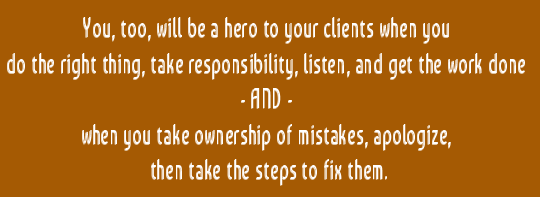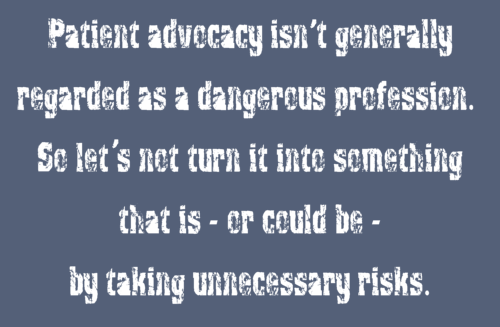This year I can tell I’m finally getting beyond the trauma. It’s a feeling of freedom to some extent, but sort of a shame to another. And you know me – I always end up analyzing these things (or, perhaps over-analyzing them) – enough so that I’m going to share some of that analysis with you.
The trauma I refer to was the cancer (lymphoma) misdiagnosis in 2004 that propelled me to change careers to patient empowerment, and eventually advocacy. By trauma, I mean that I was told I that in a few short months I would be dead, and that I butted heads with the very doctors who were supposed to help me manage my diagnosis, one a most-arrogant oncologist who, in God-like fashion, told me I was foolish to waste time getting a second opinion because “no one will know any more about your cancer than I do.”
Right.
On September 20, 2004 – 12 years ago last week – after three months of doing battle with the healthcare system, I learned from a hematopathologist at the NIH that I did not have lymphoma after all. There was no evidence of any cancer in my body. None. Zip. All these years later I have never had any treatment.
Clearly, no, I wasn’t dead in a few months. They were wrong.
Further, it cost me every penny of my savings to prove I did not have cancer, despite the fact that I had health insurance. (It was crappy, high-deductible health insurance, but I was single and self-employed, and it was all I could afford.)
Since then, every year on September 20th I have mentally celebrated what has become a rebirth of sorts. I have simply taken stock of all the positive life changes that resulted. I’ve tried to use that impetus to drive me past the PTSD that remained for so many years. It seems to work; I haven’t had a meltdown in more than two years, and life just keeps getting better and better.
I know I’m getting beyond the trauma because when Tuesday, the 20th rolled around this year, it was late afternoon before I even realized what day it was. In the past, I’ve dwelled on it for days before, and sometimes after… but this year, 2016, I barely thought about it at all. Hooray!
Of course, life lessons can always be gleaned from such an experience. So today, based on my misdiagnosis odyssey, I want to focus on behavior in the face of discord, and how it can have an enormous effect on one’s reputation and success as an advocate, just like it did for those doctors involved in my misdiagnosis. Further, over time, it can have an immense ripple effect, both good and bad – the part I call karma.
Behavior – as in – how you conduct your advocacy, your business, and how you handle the positives and negatives that come about each day.
And no – I’m not going to suggest that you always be sweet and smiley and pleasant. What I am going to suggest is that you continually command respect no matter how small or how large any given circumstance might be. And that you take responsibility for both the good and the bad, because not only can good be turned into bad, but you can affect positive outcomes from very negative things, too.
Let’s start with the good. We’ll take up the bad and the karma next week.
There were two heroes in my story.
First, my second-opinion oncologist, and second, one of the pathologists whose lab issued incorrect pathology reports. Yes, I said “INcorrect” lab reports. We’ll begin with him – the pathologist whose lab issued the wrong results:
We’ll call him Dr. Pathology. He was director of the lab that studied the golf-ball-sized lump that had been removed from my torso, the lab that diagnosed me with SPTCL – Subcutaneous Panniculitis-like T-cell Lymphoma. He, himself, had not studied the specimen. He was on vacation when it went through his lab. In effect, except for the fact that he was the director of the lab, he had nothing to do with the mistake. But years later, in February 2008, when I met him for the first time (because, face it, how often do patients meet face-to-face with the doctors who issue lab results?) – he took responsibility for the errors, and apologized to me. It was such an overwhelming experience that I wrote about it for my (then) audience of more than one-quarter million readers.
But what made him my hero was what happened after that. I was invited to visit him in his lab a few months later. He wanted to show me what changes had been made to lab protocols as a result of my communications with him after the misdiagnosis. He took ownership for the fact that some of the results had been misfiled and never reported. He took ownership for the fact that pathology second-opinions had, to that point, always been based on the first opinion (when I learned this a few years prior, I lost it; there is nothing objective about a second opinion if it is determined based on the first one!) He had worked with others in his lab to write white papers and journal articles about the resulting non-objective results of such an approach, changing protocols around the world. The bottom line, he had not only listened, but had learned, and then, had taken steps to improve the system. That’s an apology like no other. Like NO other….
So – yes – despite the fact that he represented the huge mistakes that were made, Dr. Pathology is my hero. His BEHAVIOR in the face of problems commanded my total trust and respect – even though the mistakes made by his lab were at the core of my misdiagnosis.
Which takes us to Dr. Oncology-the-Second. He’s my hero for a similar reason. He listened, he heard, and he acted. When I went for an appointment with him two months after the initial misdiagnosis, after reviewing the pathology lab results, and knowing that I just didn’t appear to be sick or dying (!) he was the person who arranged for the excised lump at the center of my lymphoma diagnosis to be sent off to the National Cancer Center (at the NIH.) The rest is history.
He, too, gets the hero label because he listened, and did the right thing, and even more so, because he bucked the original oncologist who had so arrogantly reacted to my desire to seek a second opinion. Doctors don’t often contradict each other. Dr. Oncology-the-Second is my hero because he was professional enough to not only contradict, but to take action, too.

Bottom line to today’s part of the discussion: You, too, will be a hero to your clients when you do the right thing, even in the face of discord, take responsibility, listen, and get the work done – AND – when you take ownership of mistakes, apologize, then take the steps to fix them.
Your reputation will be based on those actions, and the ripple effect will be enormous…
Which we will take up next week in Of Heroes, Trust, Discord, Arrogance, and Karma – Part II.
LEARN ABOUT APHA MEMBERSHIP | FIND MORE REASONS PATIENTS NEED ADVOCATES






Trisha, thank you! I’ve read and practically memorized each of your books. I knew you began your journey as an advocate for yourself. The fact you used your nightmare of an experience and have made it a positive is putting it lightly! Because of your decision to make a difference, MANY people myself included, have made the decision to choose Patient Advocacy as their path and mission. Many new careers, countless patients/clients that have been helped and many more to come. The perfect example of a grand scale ripple effect. Thank you for your dedication to APHA and supporting each of us on our journeys.
I had a similar experience when I sent a formal complaint to the AMA about the surgeon who did my first hip replacement. I heard from others that he had changed his bedside manner. Yay! It really made me feel empowered and I was so glad people didn’t have to put up with his arrogance.